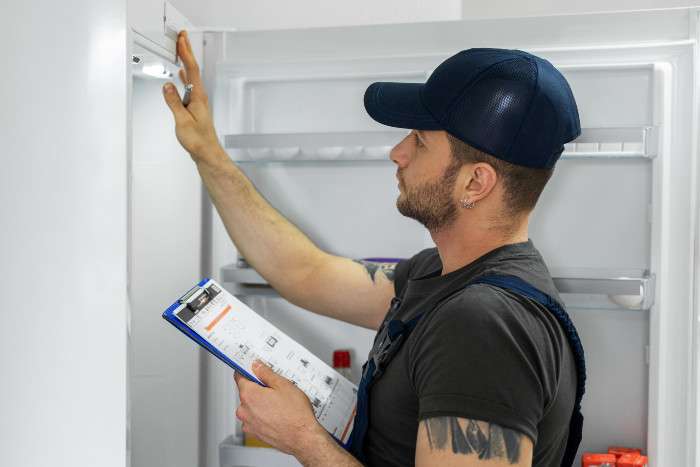Ways to Improve Your Refrigerator’s Lifespan
The refrigerator is one of the hardest-working appliances in your home. It runs eight to 10 hours a day to keep perishable food safe and fresh. If it fails, the cost and inconvenience stack up fast. That’s why regular maintenance and proper usage are so important. Stay on top of these simple, day-to-day tasks to lower your utility bills, prevent breakdowns, and avoid premature compressor failure.

Refrigerator Maintenance Tips
A little upkeep goes a long way toward avoiding common issues that require refrigerator repair. Here’s how every Chicago homeowner can improve fridge performance and lifespan:
- Clean the condenser coils every six months: Dust, lint, and pet hair gradually collect on the coils, causing the compressor to work harder. Remove buildup with a coil brush or vacuum hose. Doing this helps the fridge cool more efficiently and reduces stress on internal components.
- Check door seals regularly: The compressor must work harder and run longer if cold air leaks out through worn or loose seals. Close a dollar bill in the door, and if it slides out easily, that tells you the seals need replacing.
- Defrost or dehumidify: Some appliances have frost or humidity control buttons. If yours does, keep these engaged to avoid moisture and ice buildup. If not, you may need to manually defrost the unit to avoid straining the system. You know it’s time if frost becomes more than a quarter-inch thick.
Proper Usage Practices
Good habits matter just as much as formal maintenance. How you load and use your refrigerator directly impacts how long it lasts. Here are some best practices to keep in mind:
- Let hot food cool down first: Putting steaming leftovers directly in the fridge raises the internal temperature, forcing the appliance to work harder. Let food get closer to room temperature before storing. For safety, don’t leave food out for longer than one or two hours.
- Open the door as little as possible: Every time the door opens, warm air enters and cold air escapes. Organize food to help you grab what you need quickly and reduce temperature fluctuations.
- Space things out: Leave room around the items stored in your fridge to allow air to circulate, especially near the back of shelves and at the top of drawer compartments.
- Leave a gap around the exterior: The fridge itself also needs room to breathe. Allow several inches around the sides, back, and top for heat to escape and avoid overworking the compressor.
- Don’t let it get empty: Storing food in the fridge helps it retain coolness more effectively. Aim to keep it at the sweet spot of about two-thirds full to reduce wear on the compressor.
- Use energy-saving settings: Most newer refrigerators include energy-saving temperature settings for when you’re on vacation. These features reduce energy consumption and limit unnecessary wear when the fridge isn’t being used much.
- Replace water and air filters on schedule: Filters aren’t just for taste or odor. A clean water filter helps the ice maker and dispenser function efficiently, and a fresh air filter reduces internal humidity. Replace them every six months or as recommended to support overall performance.
- Set the temperature correctly: The best fridge setting is around 37 degrees F, and the freezer should be 0 degrees F. If the temperature is too high or too low, you may experience excessive cycling or food safety issues.
When to Schedule Refrigerator Repair Service?
Even a well-maintained refrigerator may eventually break down. Call Chicago Appliance Repair Doctor at the first sign of trouble to prevent small problems from becoming major repair bills:
- The fridge doesn’t stay cold: If your food is going bad quickly, and you’ve double-checked the temperature settings, you may have a faulty thermostat, compressor, or fan motor.
- The compressor never stops running: Your fridge should cycle on and off. If it seems to run constantly, the system may be struggling to maintain the right temperature. This could lead to the need for refrigerator compressor repair.
- Strange noises persist: Some noise is normal, but clicking, buzzing, or knocking sounds often indicate mechanical issues. A trained technician can determine whether parts require adjustment or replacement.
- Leaks appear inside or out: Pooled water may come from a clogged drain, a broken water line, or internal ice buildup. Act fast to prevent water damage and get your refrigerator running properly again.
- Your energy bills suddenly rise: A sharp increase in energy use could be a sign that your refrigerator is overworking. Dirty coils, a failing compressor, or poor seals may all contribute to the issue.
Refrigerator Repair in Chicago
Chicago Appliance Repair Doctor has been repairing refrigerators for over 20 years. We bring honesty, high-quality work, and excellent customer service to every job. Our team services all major brands and offers same-day appointments whenever possible. Thanks to our great reviews and upfront pricing, you know we’re a trusted name in home appliance repair. Contact us today for refrigerator repair services in Chicago and the surrounding suburbs.
